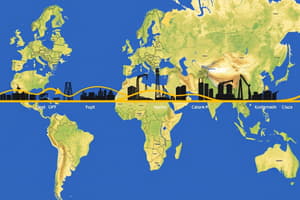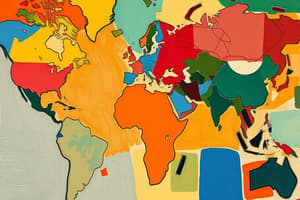Podcast
Questions and Answers
Migration has only been observed in recent times and does not have historical significance.
Migration has only been observed in recent times and does not have historical significance.
False (B)
Increased competition among workers in bustling labor markets can lead to better-quality goods and services for consumers.
Increased competition among workers in bustling labor markets can lead to better-quality goods and services for consumers.
True (A)
A diverse workforce in a country limits firms' ability to tap into a wider range of skills and talents.
A diverse workforce in a country limits firms' ability to tap into a wider range of skills and talents.
False (B)
Immigrants have not contributed significantly to entrepreneurship and innovation in host countries.
Immigrants have not contributed significantly to entrepreneurship and innovation in host countries.
Between 1975 and 2018, immigrants founded 52% of the U.S. startups valued at over $1 billion.
Between 1975 and 2018, immigrants founded 52% of the U.S. startups valued at over $1 billion.
Migration hinders economic integration among people from different cultural backgrounds.
Migration hinders economic integration among people from different cultural backgrounds.
Migration can lead to a more diverse and dynamic economy where ideas and innovation thrive.
Migration can lead to a more diverse and dynamic economy where ideas and innovation thrive.
Population growth resulting from migration can decrease consumer demand and market size.
Population growth resulting from migration can decrease consumer demand and market size.
Migration does not contribute to economic growth through driving demand for goods and services.
Migration does not contribute to economic growth through driving demand for goods and services.
Migration does not facilitate the transfer of human capital from countries with a surplus to those with a shortage.
Migration does not facilitate the transfer of human capital from countries with a surplus to those with a shortage.
Migrants in countries like Australia and Canada usually lack skills that are in high demand in industries such as technology and healthcare.
Migrants in countries like Australia and Canada usually lack skills that are in high demand in industries such as technology and healthcare.
Migration has no impact on increased investment and trade between countries.
Migration has no impact on increased investment and trade between countries.
Flashcards are hidden until you start studying
Study Notes
Migration Drives Economic Growth
Migration is a fundamental aspect of human history, with people moving across borders for various reasons such as economic opportunities, war, or climate change. This phenomenon has been observed throughout history, and it continues to play a significant role in shaping societies and economies worldwide. Here's how migration drives economic growth:
Bustling Labor Markets
Migration leads to more workers entering bustling labor markets, resulting in increased productivity and efficiency due to competition among workers. In turn, this results in better-quality goods and services for consumers. When a country's workforce is more diverse, it offers firms the opportunity to tap into a wider range of skills and talents, leading to technological advancements and better economic performance.
Entrepreneurship and Innovation
Migration plays a crucial role in fostering entrepreneurship and innovation. Immigrants often bring new ideas and perspectives to their host countries, which can lead to the creation of new businesses and technologies. For instance, in the United States, immigrants have contributed to major breakthroughs in fields such as technology, medicine, and science. Between 1975 and 2018, immigrants founded 52% of the U.S. startups valued at over $1 billion.
Economic Integration
Migration also promotes economic integration, as people from different backgrounds and cultures interact and exchange information, goods, and services. This helps to create a more diverse and dynamic economy, where ideas and innovation flourish. As a result, migrants often become part of the local society, contributing to the economy through their work and consumption patterns.
Population Growth and Consumer Demand
Migration can also stimulate population growth, leading to an increase in consumer demand and market size. This generates opportunities for businesses to expand their operations and invest in industries that cater to the needs and preferences of the growing population. As a result, migration can contribute to economic growth by driving demand for goods and services.
Human Capital
Migration also allows for the transfer of human capital from countries with an oversupply of skilled labor to those with a shortage. For example, in countries like Australia and Canada, migrants often possess skills that are in high demand and can contribute to the growth of industries such as technology and healthcare.
Investment and Trade
Finally, migration can lead to increased investment and trade between countries. As migrants move to different countries, they often maintain connections with their home countries and can facilitate trade and investment flows. This can result in increased economic ties and cooperation between countries, fueling economic growth.
In conclusion, migration drives economic growth by creating a more dynamic and diverse labor market, fostering entrepreneurship and innovation, promoting economic integration, stimulating population growth and consumer demand, and facilitating investment and trade. Migration's impact on economic growth is undeniable, and it is essential that policymakers and societies embrace this fact to ensure a more prosperous future for all.
Studying That Suits You
Use AI to generate personalized quizzes and flashcards to suit your learning preferences.




